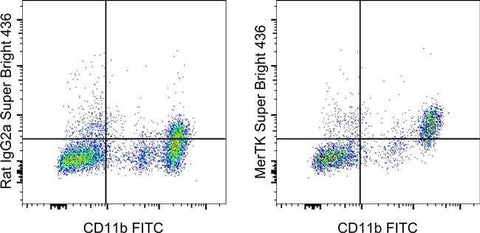
MERTK Monoclonal Antibody (DS5MMER), Super Bright™ 436, eBioscience™
カートを見る または ショッピングを続ける
説明
PRODUCT DETAILS
Host: Rat
Isotype: IgG2a, kappa
Clonality: Monoclonal
Clone: DS5MMER
Format: Super Bright™ 436
Reactivity: Mouse
Application: Flow Cytometry
Tested Dilution: 1 µg/test
Concentration: 0.2 mg/mL
Storage: 4° C, store in dark, DO NOT FREEZE!
Formulation: PBS, pH 7.2, containing 0.09% sodium azide
Purification: Affinity chromatography
Data Sheet: TDS
Specific Information
Description: This DS5MMER monoclonal antibody recognizes mouse MerTK, a 170-210 kDa member of the TAM family of tyrosine kinase receptors that also includes Axl and Tyro3. MerTK is expressed on tissue macrophages and is involved in the removal of apoptotic cells. This process relies on two soluble ligands of MerTK, Protein S and Gas6 that bind to phosphatidylserine found on the outer leaflet of the plasma membrane of cells undergoing apoptosis. Upon binding these ligands, MerTK undergoes autophosphorylation at multiple tyrosine residues that activate the PI3K and Akt pathways. This results in the phagocytosis of apoptotic cells and also results in the direct inhibition of TLR-induced production of pro-inflammatory cytokines. In addition, MerTK may function as a putative entry receptor for filoviruses. Deficiency of MerTK causes general autoimmunity, inflammation and accumulation of apoptotic bodies. MerTK is constitutively released from the cell surface by metalloproteinases and thus is present in the serum and culture medium. This process can be enhanced by stimulation with LPS. MerTK can be used to help discriminate macrophages from dendritic cells. MerTK is often expressed on malignant cells and may be implicated in immune evasion.
The DS5MMER antibody will work on paraformaldehyde-fixed cells.
Applications Reported: This DS5MMER antibody has been reported for use in flow cytometric analysis.
Applications Tested: This DS5MMER antibody has been tested by flow cytometric analysis of mouse resident peritoneal cells. This can be used at less than or equal to 1 µg per test. A test is defined as the amount (µg) of antibody that will stain a cell sample in a final volume of 100 µL. Cell number should be determined empirically but can range from 10^5 to 10^8 cells/test. It is recommended that the antibody be carefully titrated for optimal performance in the assay of interest.
Super Bright 436 can be excited with the violet laser line (405 nm) and emits at 436 nm. We recommend using a 450/50 bandpass filter, or equivalent. Please make sure that your instrument is capable of detecting this fluorochrome.
When using two or more Super Bright dye-conjugated antibodies in a staining panel, it is recommended to use Super Bright Complete Staining Buffer (Product # SB-4401) to minimize any non-specific polymer interactions. Please refer to the datasheet for Super Bright Staining Buffer for more information.
Excitation: 405 nm; Emission: 436 nm; Laser: Violet Laser
Super Bright Polymer Dyes are sold under license from Becton, Dickinson and Company.
For Research Use Only. Not for use in diagnostic procedures. Not for resale without express authorization.
